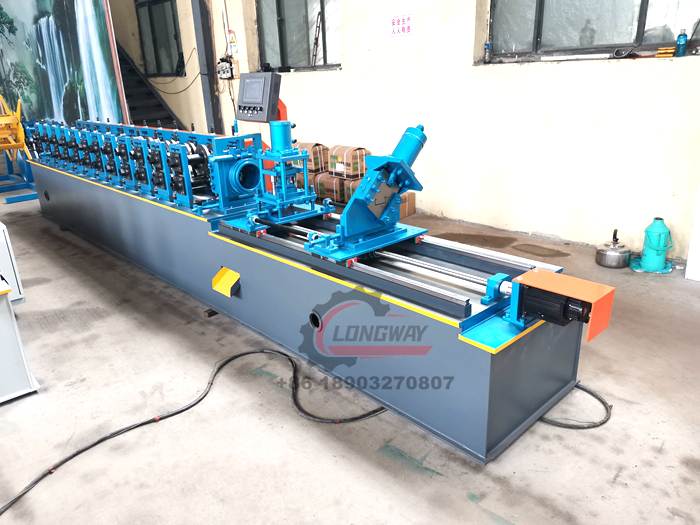roller former company
Understanding Roller Former Companies Innovations and Impact
Roller forming is a critical manufacturing process that has gained prominence in various industries, from construction to automotive. Companies specializing in roller forming have developed advanced techniques and technologies to produce high-quality metal shapes and components efficiently. This article delves into the role of roller former companies, the technology they employ, their applications, and the future of this essential industry.
What is Roller Forming?
Roller forming, also known as roll forming, is a continuous bending process in which metal strips or sheets are shaped into desired cross-sectional profiles through a series of sequential rollers. This method is ideal for producing long lengths of uniform sections, such as metal studs, tracks, panels, and roofing materials, among others. The process is highly efficient, capable of operating at high speeds, and is characterized by its ability to produce lightweight yet strong components.
The Mechanics of Roller Forming Companies
At the heart of every roller former company lies advanced machinery and skilled labor. The process begins with a flat metal sheet, usually made of steel, aluminum, or other alloys, which is fed into the rollers. The rollers, designed in specific configurations to create certain shapes, gradually bend the metal into the desired profile.
Roller former companies often utilize computer-aided design (CAD) software to create precise specifications and simulate the forming process. This technology allows for enhanced accuracy and the ability to quickly adapt to different designs. Furthermore, many companies now incorporate automation and robotics to streamline production, reducing human error and increasing efficiency.
Applications of Roller Formed Products
Roller forming has a vast range of applications across multiple industries. In the construction sector, companies use roller-formed products for structural components like beams, columns, and framing. The lightweight nature of these components makes transportation and installation more manageable while maintaining strength.
In the automotive industry, roller-formed parts are used in manufacturing vehicle chassis and body components. Delicate shapes can withstand significant loads, thus enhancing vehicle performance and safety. Other industries, such as HVAC, agriculture, and furniture manufacturing, also rely on roller-formed products for ductwork, storage solutions, and structural components.
Advantages of Roller Forming
roller former company

One of the primary advantages of roller forming is its efficiency. The continuous process minimizes scrap material, making it a cost-effective option for manufacturers. Additionally, roller-formed products often require less finishing and secondary operations, further reducing production time and costs.
Roller forming also offers design flexibility. Manufacturers can create complex shapes and profiles that meet specific engineering requirements. The ability to produce long lengths of uniform products ensures that the quality is consistent, reducing the need for rework.
Furthermore, the process can accommodate a variety of materials and thicknesses, allowing companies to adapt to changing market demands or customer specifications. This versatility makes roller forming an attractive option for a wide range of applications.
Challenges Faced by Roller Former Companies
Despite its advantages, the roller forming industry faces several challenges. One significant issue is the need for skilled labor. While automation has improved efficiency, the right expertise is still essential for operating advanced machinery and troubleshooting issues that may arise during production.
Market fluctuations and economic uncertainties can also impact the demand for roller-formed products. Companies must remain agile and responsive to changes in the industry to maintain a competitive edge.
Additionally, environmental concerns are becoming increasingly prevalent in manufacturing. Roller former companies need to adopt sustainable practices, from reducing waste to utilizing eco-friendly materials, to meet regulatory standards and consumer expectations.
The Future of Roller Former Companies
As technology continues to evolve, roller former companies are exploring innovative practices and materials. The integration of artificial intelligence and machine learning is set to revolutionize the design and production processes, allowing for even greater efficiency and precision.
Moreover, the rise of sustainable manufacturing is prompting companies to develop eco-friendly alternatives and practices. By focusing on sustainability, roller former companies can not only reduce their environmental impact but also appeal to a market that is becoming increasingly conscientious of ecological issues.
In conclusion, roller former companies play a crucial role in modern manufacturing, providing essential components across various industries. With ongoing technological advancements and a focus on sustainability, the future of roller forming looks promising, ensuring that it will continue to be a key player in the manufacturing landscape for years to come. As these companies adapt to changing demands, they will undoubtedly contribute to shaping the future of manufacturing practices globally.
-
Roof Panel Machines: Buying Guide, Types, and PricingNewsJul.04, 2025
-
Purlin Machines: Types, Features, and Pricing GuideNewsJul.04, 2025
-
Metal Embossing Machines: Types, Applications, and Buying GuideNewsJul.04, 2025
-
Gutter Machines: Features, Types, and Cost BreakdownNewsJul.04, 2025
-
Cut to Length Line: Overview, Equipment, and Buying GuideNewsJul.04, 2025
-
Auto Stacker: Features, Applications, and Cost BreakdownNewsJul.04, 2025
-
Top Drywall Profile Machine Models for SaleNewsJun.05, 2025








